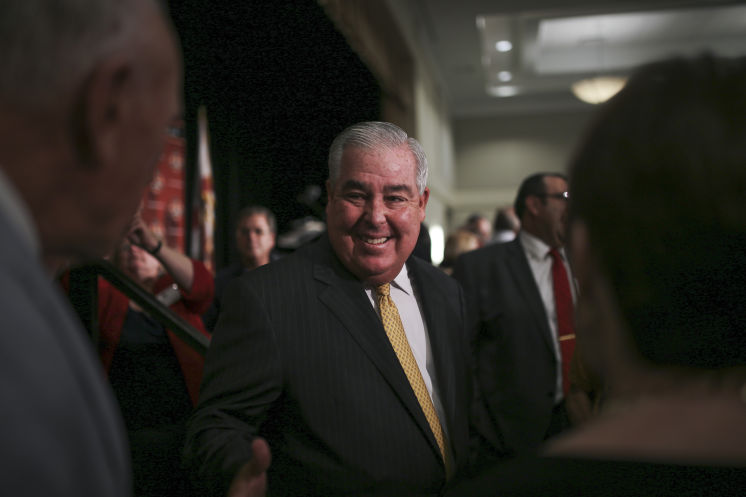A pudgy man in a white lab coat, protective goggles, and a white hardhat ambles down several long rows of potted marijuana plants. An industrial A/C unit cranks frigid air into the capacious grow room, located inside a 300,000-square-foot warehouse just outside Tallahassee, while an array of high-pressure sodium lights bathes the indoor crop in a sunny, golden hue.
Wearing latex black gloves, the tender gently inspects the flowery orange, green, and purple buds bursting from a cannabis plant that is so leafy it looks like a small tree.
All of this legal pot, pictured in a promotional video, belongs to Surterra Therapeutics, which teamed up with Homestead-based farm Alpha Foliage in 2015 to win a state medical marijuana license. Surterra is also building a 100,000-square-foot greenhouse in Hillsborough County. Together, the two facilities are about half the size of Marlins Park.
Jake Bergmann, Surterra Holdings CEO, is a soft-spoken entrepreneur with stylishly gelled brown hair and a neatly trimmed beard. A private equity manager who also owns a firm called Valkyrie Capital, he’s one of a handful of people set to make a windfall in the burgeoning medical marijuana market. His firm’s facility near the state capital is built to crank out 3,000 plants per grow cycle. Surterra has already opened two dispensaries, one in Tampa and another in Tallahassee. Plans call for six more by year’s end.
The company’s fast rollout recently prompted a private equity firm to predict Surterra could generate $138 million in sales by 2021. Though Bergmann won’t confirm that total, he’s optimistic. “We are honored outside investors believe we have such a great chance of success,” Bergmann says. “In all honesty, there is no way I could estimate the number of patients we will have or future revenues.”
Surterra is one of seven firms the state has chosen so far to manage the new medical marijuana business following last year’s 71 percent vote in favor of a constitutional amendment that legalized it. At first, pot advocates hoped state lawmakers would establish a free marketplace where as many as a half-million patients could choose from dozens of providers.
Instead, Florida’s nascent medical marijuana industry, which could be worth $1 billion by 2020, remains in the hands of seven firms — located from Tallahassee to the farmlands of South Miami-Dade. They were chosen to provide a nonpsychoactive form of weed to epilepsy patients after the state Legislature passed the Compassionate Medical Cannabis Act of 2014. Each is licensed to grow, process, and dispense cannabis. All of them, like Surterra, had to partner with Florida-based nurseries that have been in business for at least 30 years.
To get a leg up on possible new competitors, Bergmann and leaders of the other six companies have spent a combined $1.5 million on lobbyists and $667,000 in campaign contributions to Florida legislators in the last election cycle and in the 2018 matchups so far, according to a New Times review of state data. Critics — such as state Sen. Jeff Brandes — have dubbed these companies and their executives Florida’s medical marijuana “cartel.” During the legislative session this past spring, the St. Petersburg Republican proposed scrapping the state’s current program and replacing it with one similar to Colorado’s, which allows more than 500 operators to grow and sell cannabis for medicinal purposes. That bill never got out of committee.
During a special session in June, Florida lawmakers caved a little by increasing the number of marijuana-growing licenses. In August, the health department gave two new cannabis ventures the green light to launch their operations. By early October, another eight pot companies could have licenses to grow and sell medicinal weed in Florida.
But Brandes and other detractors claim the system has been set up to favor the seven companies that first secured licenses. “The laws… limit competition, inhibit access, and result in higher prices for patients,” the senator says. “Florida should focus on what is best for patients.”
Jodi James, executive director of the Florida Cannabis Network, agrees. Current rules prevent mom-and-pop operators from ever setting up shop. “I was hopeful we would see more of a cottage cannabis industry,” James says. “The organizations that have licenses spent an awful lot of money lobbying lawmakers, and what we saw come out of the legislative and special sessions had their fingerprints all over it.”
Responds Surterra’s Bergmann: “Honestly, I laugh about it… In reality, we are highly regulated and compete intensely with the six other competitors.”
So far, the state has authorized ingestion of pot only through vaporizers and tinctures. Smokeable buds are not allowed. And providers are limited to a maximum of 25 dispensaries.
Over the past several months, New Times dug into the backgrounds of the seven companies’ current and former owners, executives, and partners. These marijuana moguls include some of the state’s best-connected and savviest businesspeople. Many also have backgrounds that haven’t been explored in-depth. Among them are a real-estate developer once tied to political corruption, a hedge fund manager who recruited two gambling tycoons as investors, an attorney embroiled in a burgeoning Tallahassee FBI probe, a Gainesville entrepreneur who bought a franchise from one of the largest cannabis companies in Colorado, an ex-IBM executive, a Miami mortgage broker, and some of the largest nursery operators in Florida.
credit:miaminewtimes.com



